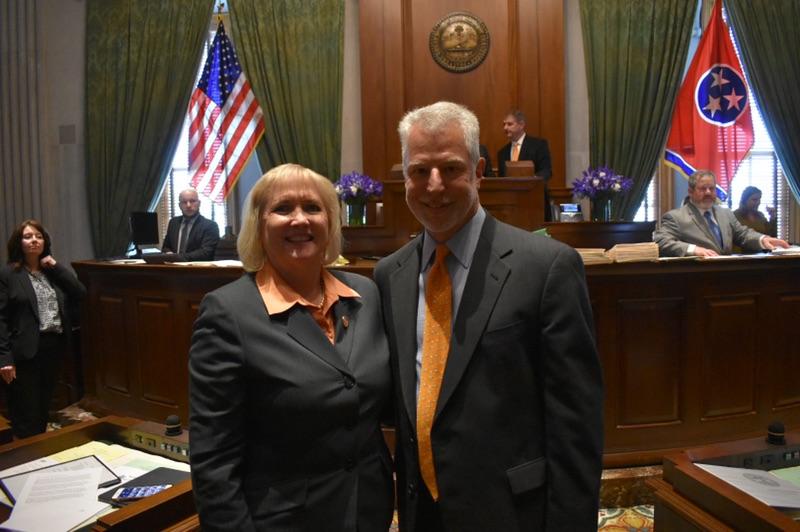
2019 legislative session adjourns with tax reduction and healthcare improvements highlighting final week of legislative action
The 2019 session of the 111th General Assembly has adjourned to become a part of Tennessee history with some of the most important bills of the year approved during the final week of legislative action. This includes the passage of the state budget, legislation expanding TennCare coverage for in-home care for children with severe disabilities, a bill to eliminate the state’s professional privilege tax for 15 licensed professions, and several significant measures improving education and public safety.
The $38.6 billion balanced budget proposes state government spending for the next fiscal year that begins July 1, 2019, and extends to June 30, 2020. Senate Bill 1518 maintains Tennessee’s sound fiscal practices by not taking on any new debt, continuing to reduce unnecessary spending through state government efficiencies, and putting a record investment in the state’s emergency savings account, better known as the Rainy Day Fund. Such fiscally conservative practices have resulted in Tennessee being ranked among the best managed states in the nation.
The budget continues to support education, focuses on the needs of Tennessee’s rural and distressed counties and encourages job creation, while taking care of some of our state’s most vulnerable citizens. The budget provides $27.4 million to fund the Katie Beckett program which aids some of the state’s sickest and most medically-complex children. It also includes $22 million to reduce the professional privilege tax for 15 professions in Tennessee. The General Assembly has cut or reduced taxes every year since 2011, saving taxpayers approximately $800 million. This includes reducing the sales tax on food by nearly 30 percent, phasing out the Hall income tax, eliminating the gift and inheritance taxes, and cutting taxes on manufacturing to enhance job creation.
Highlights of the budget include:
Sound Financial Practices
· Historic deposit to the Rainy Day Fund of $225 million, bringing the emergency fund to the highest level in state history at $1.1 billion;
· Puts $4.6 million in the state’s pension fund to reduce future liabilities and keep promises to retirees, as well as maintain Tennessee’s status as the least indebted state in the nation per capita; and
· Reserves approximately $15 million to fund future tax relief next year.
Education Investments
· Provides $71 million for teacher pay raises;
· Includes $39.4 million to fully fund the state’s Basic Education Program (BEP);
· Includes a total of $40 million for school safety grants for K-12 schools; and
· Provides $8 million to expand the Tennessee Early Intervention Services Program for young children up to age three with learning challenges.
Prioritizing Vocational Education
· Includes $25 million for the Governor’s Investment in Vocational Education (GIVE) Initiative community grants to upgrade and expand K-12 and career and technical education programs in rural areas;
· Provides $4 million to increase access to vocational education for high school students by doubling the dual enrollment credits available;
· Contains $12.3 million for additional needs-based student assistance awards;
· Provides $2 million in grants to enhance rural high school career initiatives; and
· Includes $426,000 recurring and $975,000 non-recurring for Correctional Education program for inmates to help them obtain employment and reduce recidivism.
Improving Healthcare
· Includes $27.34 million to create a Katie Beckett program to help families provide in-home care for some of the state most vulnerable children;
· Provides $9.3 million to the Employment and Community First Choices (ECF) program to expand services to help individuals with intellectual or developmental disability gain as much independence as possible;
· Provides $3.5 million for Tennessee’s Health Care Safety Net, which provides primary care, behavioral health, case management, and emergency dental services to uninsured adults age 19 to 64;
· Provides $3.5 million to serve the uninsured in Tennessee through increased funding for community faith-based organizations and federally qualified health clinics which assist the Department of Health in providing services; and
· Includes $11.9 million to continue funding appropriated last year to raise the pay of direct services personnel working with individuals with intellectual and developmental disabilities.
Renewed Focus on Mental Health
· Contains $5 million for the state’s Behavioral Health Safety Net to expand services to an additional 7,000 uninsured adults with serious mental illness;
· Provides $3 million for a new Creating Homes Initiative that will provide regional housing facilitators to help those recovering from substance use disorder;
· Provides $4 million for a transportation plan to help mentally ill or individuals suffering from Alzheimers or dementia from being transported by law enforcement officers; and
· Adds $6.2 million to support the state’s four regional mental health institutes.
Creating Job Opportunities
· Includes $20 million for broadband initiatives to fund the final year of a three-year initiative to increase broadband accessibility through grants and tax credits in rural areas which is critical to job development;
· Provides $70 million to create new job opportunities for Tennesseans through FastTrack job development;
· Provides $15 million to promote innovation and entrepreneurship aimed at increasing new businesses from research and development activities throughout the state for rural development grants loans for small minority and women-owned rural businesses; and
· Includes $4 million for the Tourism Marketing Task Force to aid the state’s tourism industry which has a tremendous impact on Tennessee’s economy.
Safer Communities
· Includes $3.3 million to increase the penalties for fentanyl and its derivatives;
· Provides $15.6 million to increase the starting pay for corrections officers and $5.5 million to raise salaries for veterans officers and counselors in the state’s prisons to hire and retain personnel essential to public safety;
· Adds $2.4 million to hire 40 additional state probation and parole officers to reduce the current caseload levels and bring supervision standards in line with industry best practices
· Provides $1 million in grants to Men of Valor and Project Return to help keep former offenders on the right path; and
· Includes $1.6 million to increase pay for attorneys representing indigent defendants and $1.7 million in statutory raises for the state’s District Attorneys (DA) General.

Meeting with the Fox family and discussing the “Katie Beckett Waiver Bill”, which I was a co-sponsor.
Senate approves “Katie Beckett Waiver Bill” to expand TennCare coverage for in-home care to children with severe disabilities
A major bill expanding TennCare coverage for in-home care to children with severe disabilities, regardless of their parents’ income, received unanimous approval by the Senate during the last week of legislative action. In order to implement the TennCare changes, Senate Bill 476 directs the Tennessee Department of Finance and Administration to submit a waiver request to the U.S. Center for Medicare and Medicaid Services (CMS) to establish a Katie Beckett Program in Tennessee.
Most of the children that would be affected by the program require around-the-clock care due to medically-intensive and complex disabilities.
The program is named for a young girl who was diagnosed with a brain infection in 1978 at only five months old. Medicaid covered Katie’s hospitalization for almost three years after being diagnosed. However, once her parents and doctors decided she would receive better care at home, she was no longer eligible to receive Medicaid, although her home care cost would have been one sixth of the expenses incurred in a skilled healthcare setting. Once President Ronald Reagan heard of this situation, his administration waived the rules to let Katie and children in similar situations receive care at home, while retaining their Medicaid coverage regardless of their parents’ income. This gave rise to the Katie Beckett Program which created the opportunity for states to apply for a waiver, allowing them to use federal and state dollars to pay for a child’s in-home care.
The bill now goes to Governor Bill Lee for his signature.
Legislature approves bill eliminating professional privilege
tax for 15 of the state’s licensed professions
The General Assembly passed major tax cut legislation before adjourning the 2019 session, eliminating the $400 professional privilege tax levied on licensed individuals annually in 15 professions in Tennessee. Senate Bill 398 repeals the tax for accountants, architects, sports agents, audiologists, chiropractors, dentists, engineers, landscape architects, optometrists, pharmacists, podiatrists, psychologists, real estate brokers, speech pathologists, and veterinarians.
The professional privilege tax was implemented in 1992 at $200, but was increased to $400 in 2002. Action on the legislation comes after a 2016 Tennessee Advisory Commission on Intergovernmental Relations (TACIR) report stated that some professions in the state that are not taxed have higher average incomes. The report also noted that incomes of professionals vary significantly within the taxed professions and those in occupations earning lower salaries, pay the same amount as those earning more. Professionals in these areas must pay the tax annually even when they conduct no business. Tennessee is one of only six states that impose a professional privilege tax.
The General Assembly reserved approximately $15 million for additional tax relief next year. Lawmakers want to offset a windfall of online sales tax revenue expected to be realized as a result of the U.S. Supreme Court’s Wayfair decision with additional tax relief. The decision allowed states to collect online sales taxes. This bill, which I was a co-sponsor, passed unanimously.

It was an honor to host Coach Rick Barnes and Vol Legend, Tony White. I presented them with a Resolution honoring the UT-K basketball team for their accomplishments this season.
In Brief….
Mentors for Children who are deaf — The Senate passed legislation unanimously that I was the sponsor, stablishing a mentor pilot program to assist families of children who are deaf. There is currently a critical need for language acquisition for children who are deaf from birth to age five. Studies show that 70 to 80 percent of children who are deaf entering into kindergarten have a 500 word vocabulary, while their average peer has a 2,000 word vocabulary. Senate Bill 310 aims to close this gap by requiring the Tennessee School for the Deaf in Knoxville to establish a one-year mentor pilot project to assist families and agencies in implementing home-based programming for children who are deaf, hearing impaired, or deaf-blind before they enter kindergarten. The pilot program will provide parents with the necessary training to be their child’s first teacher and lay the groundwork for lifelong communication ensuring their child enters school ready to learn.
JaJuan Latham Act / Strengthening Penalties for Drive-by Shootings — Legislation strengthening penalties against those convicted of harming a minor during a drive-by shooting received final approval by the General Assembly this week. Senate Bill 10 is named the JaJuan Latham Act for a 12-year-old, Knoxville boy who was killed in a drive-by shooting while in the back of his father’s parked car. JaJuan had just attended a “Stop the Violence” basketball game organized by former University of Tennessee basketball player Bobby Maze. The event was honoring the memory of JaJuan’s cousin, Zaevion Dobson, who was also killed in a drive-by shooting just months earlier while shielding several girls from gunfire.
The bill establishes enhanced penalties when discharging a firearm from a vehicle results in harming a minor. Offenses include intentional/knowing aggravated assault, reckless aggravated assault, second degree murder, voluntary manslaughter, reckless homicide, and criminally negligent homicide. Upon being signed by Governor Lee, Tennessee will join other states that have enhanced penalties due to the reckless and wanton manner of the crime. Senator Briggs was the sponsor and I was a co-sponsor.
Truth in Sentencing — The Senate approved “truth in sentencing” legislation this week which ensures that Class A, B, or C felons, which are violent offenders, are required to serve the minimum sentence for their crimes before being eligible for reduction credits for good behavior. Senate Bill 215 allows both crime victims and perpetrators to have an accurate timeframe for minimum sentencing. It also presumes that Class E or D nonviolent felons will be released on parole when they reach their “red date” or release eligibility date, unless good cause is shown for why the inmate should not be released.
Statute of Limitations — Legislation removing the statute of limitations for second degree murder was approved by the Senate 32-0. Senate Bill 593 extends the statute of limitations for prosecution of second degree murder from 15 years after the offense to any time after the offense is committed. The legislation comes from the recommendation of the 110th General Assembly’s Tennessee Advisory Commission on Intergovernmental Relations (TACIR) study and will bring Tennessee in line with criminal law regarding the statute of limitations from across the country.
Leigh Ann’s Law / Domestic Violence — The full Senate showed their continued support for domestic abuse victims in passing the Leigh Ann Act 31-0. The legislation is named for a Tennessee woman who was murdered 17 years ago in an act of domestic violence by her former boyfriend who violated a no contact order. Senate Bill 1163 creates a Class A misdemeanor for a person who is arrested on domestic violence charges to knowingly violate a no contact order that is issued prior to the defendant’s release on bond. The bill now awaits Governor Lee’s signature before becoming law.
TNReady Tests — Final approval was given to legislation last week changing the way the TNReady test will be administered in the 2019-2020 and 2020-2021 academic school years. Senate Bill 187 requires that the TNReady test be administered in paper format for the 2019-2020 school year. As for the 2020-2021 academic year, the Local Education Agencies (LEAs) will be required to participate in an online verification test conducted by the Department of Education. The Commissioner of the Department of Education will then use the verification test results to determine which format to administer the TNReady test for that school year. The bill passed 33-0.
Michelle’s Law / Teachers — The full Senate passed “Michelle’s Law” (31-1) supporting the children of deceased Tennessee public school teachers and Local Education Agencies (LEAs) technology coordinators. The legislation is named for a public school teacher who passed in a tragic accident leaving behind her two young children. Currently, a student under 24 years old attending a Tennessee public university whose parent is a retired or current public school teacher or technology coordinator receives a 25 percent tuition discount. If a student’s parent passes away while they are already receiving the tuition discount, then that student shall continue to receive the discount. Senate Bill 1530 extends the current eligibility for students not yet enrolled in a Tennessee public university and whose parent passed away while he/she was a teacher or technology coordinator to receive the 25 percent discount once they enroll in a public university.
Alternative Growth Portfolio Model / Kindergarten – The full Senate approved legislation which provides local education agencies (LEAs) with the option to use comparable alternative student growth measures for pre-K and kindergarten growth portfolio models. When the pre-K and kindergarten portfolio models were implemented last year, the program experienced several early implementation problems. These problems included a lack of appropriate training for teachers, computer system issues and difficulties with the way the portfolio’s standards were clustered together. Senate Bill 442 helps ensure that the work done by teachers in non-graded subjects is evaluated fairly and is not burdensome to teachers. It also states that employment termination and compensation decisions for the 2018/2019 school year shall not be based on data generated by the portfolio model. Finally, the legislation creates a 10-member portfolio review committee. I was a co-sponsor of this bill which passed 33-0.
School Bus / Video Cameras – State senators voted to approve legislation this week authorizing a Local Education Agency (LEA) to place cameras on the outside of school buses to document drivers who illegally pass a stopped school bus. Senate Bill 205 allows LEAs to use cameras on the exterior of school buses, in coordination with local law enforcement, for the purpose of deterring drivers who fail to stop for a school bus loading or unloading students. The legislation follows an increase in cars running through bus stops even when the stop-arm is out and lights are flashing. This fall, the Knox County school system had several children hit by cars while at a bus stop. The National Conference of State Legislatures (NCSL) reported there are over 80,000 drivers who run through these school bus stop signs every day, with an average of eight deaths a year. With this bill, any driver determined to be in violation of the law will first receive a $50 fee, while subsequent violations can be prosecuted as a Class A misdemeanor. The legislation now awaits the governor’s signature. This bill, which I supported, passed 27-3.
Pharmacies / Patients — The Senate gave final approval 32-0 to legislation that supports healthcare consumers in Tennessee and the pharmacies that provide care to them by establishing certain rights for pharmacies regarding fair contracts with Pharmacy Benefit Managers (PBMs). This includes protection of a pharmacist’s professional judgement when determining when to dispense a drug or another product to a patient. Senate Bill 650 establishes a fair playing field between PBMs and pharmacies. Other provisions of the bill include protections for pharmacists regarding audits and recoupments of prescription claims, increased transparency and disclosure of all fees charged to pharmacies by PBMs at the time of claims processing, and 30 days advance notification to the pharmacy of any network changes.
Daylight Saving Time — The Senate voted 29-1 to keep Tennessee on daylight saving time once the federal government has approved it. Senate Bill 1100 puts Tennessee on record in favor of federal legislation currently pending in Congress which calls for daylight saving time year-round. According to studies, since time changes have been implemented in the 1960s, there has been a statistically significant increase in wrecks, heart attacks, and strokes, as well as a decrease in work productivity and an increase in workplace accidents. President Trump has stated he supports a permanent daylight saving time. I was a co-sponsor of this bill.
Hand-held Phones / Driving — Legislation prohibiting a person from physically holding a cellphone while operating a motor vehicle that is in motion was approved 23-7. (I voted for this bill.) The purpose of Senate Bill 173 is to save lives by discouraging distracted driving. A person may still talk on the phone while driving, but must do so using hands-free devices such as an earpiece, headphone device, wrist device, or connectivity to a vehicle. Violation of the offense would result in a fine of up to $50 for the first and second offense. The violation will result in a $100 fine for a person’s third offense or if an accident occurs.

I was honored to be presented the 2019 Advocacy Award by AWAKE-Advocates for Women’s And Kinds’ Equality for my legislative work in the fight against domestic violence.

It was a pleasure hosting Rev. Scott Jackson of New Life Gathering who gave the opening prayer in the Senate

I enjoyed the visit by students from Episcopal School of Knoxville… including my great-nephew, Shep Brown

Senator Briggs and I honored the state champion Bearden High School basketball team

It is always a treat to go by the Comcast Cares Day and thank the volunteers. This year they were working at Green Magnet Elementary School
Me in office
For information on State Senators including phone numbers and email addresses, click Tennessee State Senators.
For House members, click Tennessee House Members
For all other information on the General Assembly including legislation, schedules and videos, click Tennessee General Assembly
As always thank you for continued support!
Sincerely,
Becky Massey
District 6 Senator
615-741-1648.
